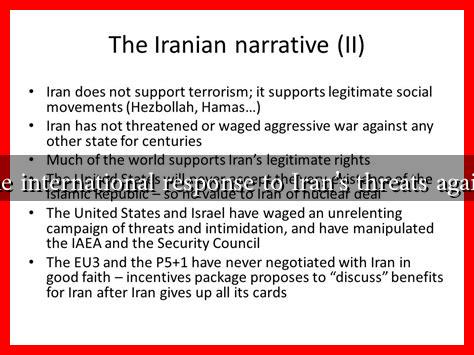-
Table of Contents
What is the International Response to Iran’s Threats Against Israel?
Iran’s threats against Israel have been a persistent issue in international relations, particularly in the context of Middle Eastern geopolitics. The Islamic Republic has openly declared its opposition to Israel, often using inflammatory rhetoric and supporting militant groups that threaten Israeli security. This article explores the international response to these threats, examining the reactions from various countries and organizations, as well as the implications for regional stability.
The Nature of Iran’s Threats
Iran’s threats against Israel are multifaceted, encompassing military, political, and ideological dimensions. Key aspects include:
- Military Posturing: Iran has developed a significant military presence in the region, including missile capabilities that can reach Israeli territory.
- Support for Proxy Groups: Iran funds and arms groups like Hezbollah in Lebanon and Hamas in Gaza, which have engaged in armed conflict with Israel.
- Rhetorical Aggression: Iranian leaders frequently use anti-Israel rhetoric, framing their stance as a defense of Palestinian rights.
Responses from Israel
In response to Iran’s threats, Israel has adopted a proactive and often aggressive stance. Key elements of Israel’s response include:
- Military Action: Israel has conducted airstrikes against Iranian targets in Syria to prevent the transfer of advanced weaponry to Hezbollah.
- Intelligence Operations: Israel has engaged in covert operations to disrupt Iranian activities and gather intelligence on its nuclear program.
- Diplomatic Alliances: Israel has strengthened ties with countries like the United States and Gulf states, forming a united front against Iranian aggression.
International Reactions
The international community’s response to Iran’s threats against Israel has been varied, reflecting differing geopolitical interests and alliances.
. Key players include:
The United States
The U.S. has been a staunch ally of Israel, often condemning Iran’s threats. The Biden administration has taken a dual approach:
- Diplomatic Engagement: Efforts to revive the Joint Comprehensive Plan of Action (JCPOA) have been met with skepticism, as Iran continues its aggressive posturing.
- Military Support: The U.S. has increased military aid to Israel, including advanced missile defense systems like the Iron Dome.
The European Union
The EU has expressed concern over Iran’s threats but has also emphasized the need for dialogue. The EU’s response includes:
- Sanctions: The EU has imposed sanctions on Iran for its nuclear activities and support for terrorism.
- Diplomatic Initiatives: The EU has attempted to mediate between Iran and Israel, advocating for a peaceful resolution to the conflict.
Regional Responses
Countries in the Middle East have also reacted to Iran’s threats, often aligning themselves based on their interests:
- Gulf States: Nations like Saudi Arabia and the UAE have expressed solidarity with Israel, viewing Iran as a common threat.
- Turkey: Turkey has maintained a complex relationship with Iran, often criticizing Israel while also engaging in economic partnerships with it.
Case Studies: Recent Escalations
Recent events illustrate the ongoing tensions between Iran and Israel:
- 2021 Gaza Conflict: Iran’s support for Hamas during the conflict led to increased hostilities, prompting Israeli airstrikes and international condemnation of both sides.
- Cyber Warfare: Iran has been accused of cyberattacks against Israeli infrastructure, leading to retaliatory measures from Israel.
Conclusion
The international response to Iran’s threats against Israel is complex and multifaceted, involving military, diplomatic, and economic dimensions. While Israel continues to take a proactive stance against Iranian aggression, the responses from the U.S., EU, and regional players reflect a mix of support for Israel and calls for dialogue with Iran. As tensions persist, the potential for conflict remains high, underscoring the need for a coordinated international approach to ensure stability in the region.
For further reading on this topic, you can explore resources from the C-SPAN and BBC News.





